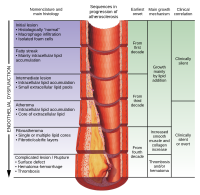
Photo from wikipedia
Problem Cardiovascular disease (CVD) is the leading cause of death in the U.S. and in most Western countries. Early identification and treatment of individuals with elevated levels of atherogenic cholesterol,… Click to show full abstract
Problem Cardiovascular disease (CVD) is the leading cause of death in the U.S. and in most Western countries. Early identification and treatment of individuals with elevated levels of atherogenic cholesterol, a major contributor to CVD, have been shown to be effective and safe in reducing premature morbidity and mortality, especially in familial hypercholesterolemia (FH). Cholesterol screening of youth also provides a unique means of identifying affected family members through reverse cascade screening (RCS). Eligibility Criteria A PubMed review of all relevant articles from 2000 to 2016 was conducted of familial hypercholesterolemia and cholesterol screening of youth. Results We provide an overview of cholesterol screening, outline the role of the pediatric nurse in the lipid clinic, and discuss effectiveness and potential barriers, including cost and confidentiality considerations of RCS. Conclusions Early identification and effective intervention of youth with FH, including adoption of a heart‐healthy lifestyle, has the potential of 1) markedly reducing or eliminating atherosclerotic cardiovascular disease and related events in future generations and 2) provides a unique means of identifying affected family members. Implications Pediatric nurses play a vital role in the education and care coordination of children diagnosed with FH and screening of relatives. Identification of a child with FH with effective screening of relatives combines the benefits of universal and cascade screening, and has the potential of detecting all living cases of FH. While potentially providing significant benefit to those at risk for premature CVD, a RCS program needs to carefully consider ethical, psychological, and financial implications as well. HighlightsFamilial hypercholesterolemia (FH) is a genetic condition associated with lifelong elevation of cholesterol.Screening youth for FH provides means of identifying children at risk as well as their family members.Pediatric nurses play a key role in education and care of children diagnosed with FH.
Journal Title: Journal of Pediatric Nursing
Year Published: 2019
Link to full text (if available)
Share on Social Media: Sign Up to like & get
recommendations!